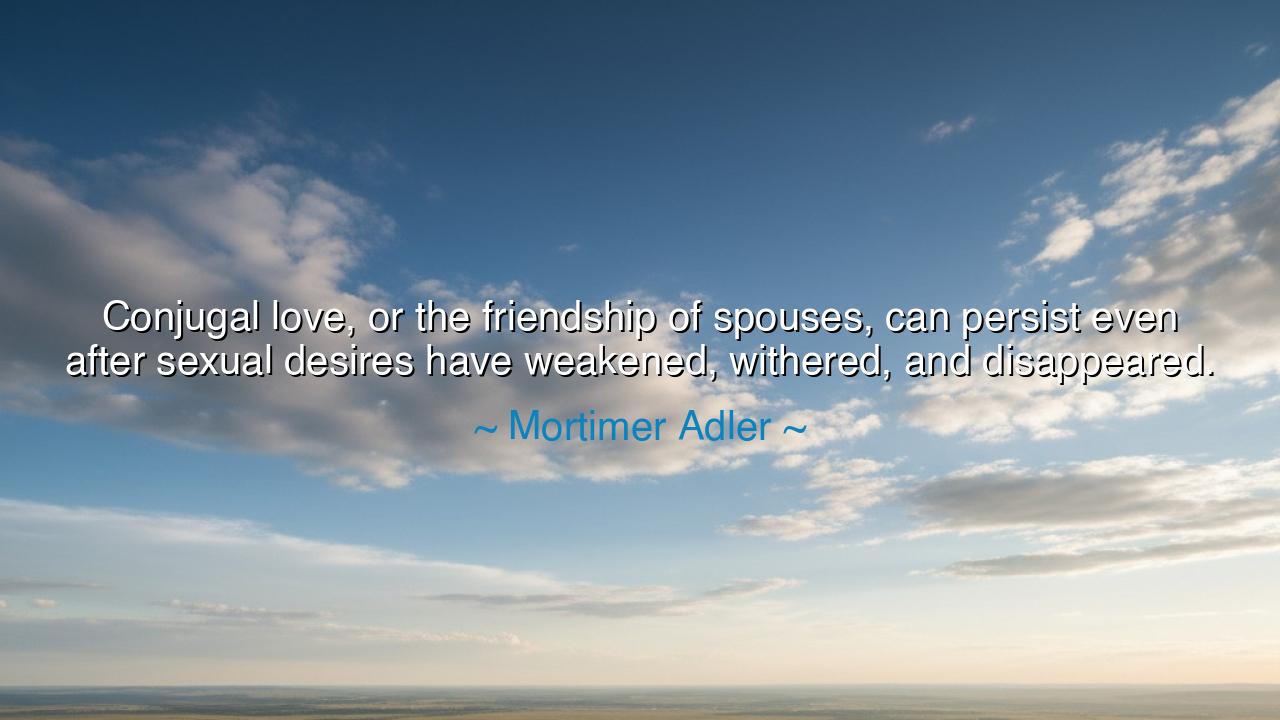
Conjugal love, or the friendship of spouses, can persist even
Conjugal love, or the friendship of spouses, can persist even after sexual desires have weakened, withered, and disappeared.






“Conjugal love, or the friendship of spouses, can persist even after sexual desires have weakened, withered, and disappeared.” In this line of serene wisdom, Mortimer Adler, philosopher of ethics and human understanding, speaks not of the fleeting heat of passion, but of the enduring fire that remains when the body grows quiet and the heart matures. He reminds us that love, when founded on true friendship, is not imprisoned by the boundaries of youth or desire. It is a higher form of companionship — one that ripens, rather than fades, with time. His words carry the grace of the ancients, teaching that marriage is not merely the union of bodies, but the communion of souls.
At its core, Adler’s reflection captures the distinction between desire and devotion. In the beginning of love, the senses are aflame; the world narrows to two souls intoxicated by one another’s nearness. But passion, though divine in its own right, is bound by nature — it ebbs as years pass, as faces change, as the bloom of youth gives way to the lines of experience. Yet in those who have loved well, a transformation occurs: passion deepens into tenderness, desire becomes understanding, and the spark of physical union evolves into the steady glow of spiritual companionship. The friendship of spouses is, therefore, not a lesser love — it is love perfected by time and tested by life.
The origin of Adler’s insight lies in his lifelong devotion to Aristotelian philosophy. In the teachings of Aristotle, friendship (philia) is the highest form of human relationship — not one of utility or pleasure, but of virtue, where each wishes the other’s good for the other’s sake. Adler, who sought to unite reason and morality, saw marriage as the living embodiment of this principle. For what is conjugal love but the daily practice of wishing another’s happiness as one’s own? To him, the decline of passion was not a tragedy, but a passage — a movement from the transient to the eternal, from the fiery to the steadfast.
History offers us luminous examples of this truth. Consider John and Abigail Adams, whose marriage weathered long years of separation during the American Revolution. Their letters — tender, intellectual, sometimes playful — reveal a union founded not on physical presence but on deep mutual respect and affection. When youth had long passed and their hair had turned to silver, they still addressed each other as “my dearest friend.” Their love had outlived distance, war, and age because it was built not upon desire alone, but upon the enduring structure of companionship and understanding. In them, we see Adler’s vision fulfilled: a friendship so complete that even time could not diminish it.
Adler’s words also invite us to confront a truth that modern hearts often fear — that passion, no matter how glorious, is not sufficient to sustain a life together. Many pursue love as if it were only flame, forgetting that fire without foundation burns itself out. But the wise know that true love is both flame and stone: it warms the soul yet builds a home strong enough to shelter it through the winters of life. When desire fades, as it must, what remains is what was always meant to remain — trust, affection, laughter, shared memory, and peace. In this quiet realm, love becomes less a fever and more a faith.
The lesson is clear and noble: seek friendship within your love, and love will endure beyond the reach of time. To marry merely for passion is to build upon sand; to marry for friendship is to build upon rock. If one would have love that lasts, one must nurture understanding, forgiveness, and the small kindnesses that keep hearts intertwined. Let there be shared dreams, but also shared silences; let there be admiration that grows even as beauty fades. In the friendship of spouses lies a joy that no decay of flesh can touch — a joy that belongs not to the body, but to the soul.
In practical life, this means tending not only to romance, but to respect. Speak gently, even when years have made conversation familiar. Listen to your partner’s heart as you did in youth, for though the voice may age, the soul within it remains young. Laugh together, remember together, suffer and endure together — and you will discover that the bond between you becomes something deeper than you ever imagined. For passion kindles love, but friendship immortalizes it.
Thus, Mortimer Adler’s words stand as a quiet hymn to the enduring spirit of conjugal love — a love that begins in desire but matures into destiny. When two souls walk through life as companions, their affection becomes like an old oak tree: its blossoms may fall, but its roots grow ever stronger beneath the earth. And when the night of age descends and passion’s fire softens to an ember, they will find, in each other’s gaze, not loss, but the serene light of completion — for the friendship of true spouses is the final proof that love, once made pure by time, need never die.






AAdministratorAdministrator
Welcome, honored guests. Please leave a comment, we will respond soon